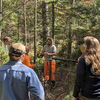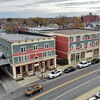You don’t need to be in Cambridge to do great science
Some scientists thrive in intensely competitive, highly collaborative environments like the Boston/Cambridge area, Silicon Valley or Research Triangle Park, N.C.
Others find all that hustle and bustle inhibiting to deep thought and time to try different things. I discovered such researchers while reporting the cover story in this issue on Maine Medical Center Research Institute in Scarborough. They were willing to give Maine a chance, and are thriving in labs performing cutting-edge research in cancer, bone growth, fat metabolism and stem cells.
The institutions where scientists do postdoctoral work and their first job out of school shape the rest of their careers. That's why some pick large, well-known institutions in cities where they can notch up big points on their résumé. Such organizations are magnets for funding from federal agencies, foundations and private companies alike.
But there are drawbacks, like the intense competition to get your own lab. Not to mention such environments can be over stimulating, and actually stifle creative thinking.
“Too much collaboration can be inhibiting,” Michaela Reagan, a Harvard Medical School graduate who will join MMCRI in late September, told me. She's now finishing postdoctoral research in multiple myeloma at Boston's Dana-Farber Cancer Institute.
The newly minted scientist will have her own lab at MMCRI, making it that institution's 13th laboratory.
“It's similar to where I grew up,” the native Vermonter said of Maine. “I think it's a great environment. You don't have to be at Harvard to do good science.”
And while she's aware that Maine as a whole receives much less federal science funding than Massachusetts, she's undaunted about raising grant money. All MMCRI researchers have to raise all the funds for their own labs. She's bringing with her some money from an existing grant, plus some additional funds she expects from a soon-to-be signed collaborative agreement with a biotech company.
“I'm not concerned to come to Maine. Young postdocs need space, and Harvard is crowded,” she said. The first item on her agenda when she moves here in September: buying a hardy winter car like a Subaru.
But federal monies have been tightening up over the past decade, and the trend shows no signs of abating.
That worries Dr. Clifford Rosen, director of the Center for Clinical and Translational Research and a senior scientist at MMCRI. He recruited Reagan, and while he feels she can meet the task, he's worried about future researchers, given the lower success rate of getting a grant because of less funding.
Another issue: grant approvals are being delayed until the federal government agrees on a budget. “Congressional debate determines your fate,” he said.
A recent report from the Massachusetts Institute of Technology warned that the United States risks falling behind other countries like China in cutting-edge developments because of the federal funding cuts to basic research.
Rosen said the state of Maine used to give MMCRI a couple $100,000 a year, but that dried up about two years ago, and he doesn't have much hope of seeing more money from the state.
“If you add up all the funding into Maine, you might see more critical mass in funding, but it's all in little pockets. MMCRI is basic research, which is hard to fund,” said Todd Keiller, director of the Office of Technology Transfer at MMCRI. “We are doing the 'R' part of R&D.”
One positive for the future of science in Maine that Rosen cites is Susan Hunter's appointment as president of the University of Maine. A bone-cell biologist by training, Hunter collaborated with Rosen in the 1980s.
“My great hope is that she is a role model for people,” Rosen told me. “As a state we haven't enhanced our universities to feed the local economy.”
However, he says Portland has proven a great recruiting tool.
“People and their spouses love to come to Portland,” he said, adding that it's close to Boston.










Comments